Wood Facts Continued
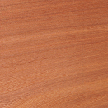
Elm
Color: Brown to dark brown, sometimes reddish heartwood
Density: Moderately hard and heavy wood
Grain: Mostly coarse open grain
Machinability: Machines fairly well, can be abrasive to tooling at times
Finishing: Takes finish well. We suggest using a sanding sealer.
Distinctive Characteristics: Has been used as a Chestnut substitute, good bending quality
Common Uses: Bent chair backs, some furniture, flooring, paneling, some cabinets
Other Names: Red Elm, Slippery Elm, American Elm (Gray Elm) has a gray-white color with a slightly tighter and more closed grain.
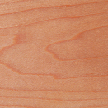
Hard Maple
Color: Creamy white to off white sapwood-tinged occasionally with slight red brown heartwood
Density: Hard, heavy and strong, very resistant to shock and abrasive wear
Grain: Closed grain, uniform texture. Some of the figured Hard Maple is available (Curly, Birdseye, and Quilted)
Machinability:Excellent, will tear out with dull tooling
Finishing: Finishes very well. Some of the figured woods will show variable levels of penetration.
Distinctive Characteristics: Great wood for applications requiring hardness. Birdseye and curly patterns are available.
Common Uses: Furniture, handles, cabinets, woodenware, flooring, paneling, millwork and mouldings
Other Names: Sugar Maple, Black Maple, Norway Maple, Rock Maple
Available in Certified: Check for availability
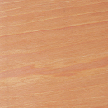
Hickory
Color: Tan to reddish brown heartwood, cream to yellowish sapwood (variable mixture of heart and sap)
Density: Very hard, strong, stiff and heavy
Grain: Moderately coarse open grain
Machinability: Excellent machinability, but very abrasive on tooling
Finishing: Will take stains.
Distinctive Characteristics: The combination of its hardness, strength, toughness, and stiffness are unmatched by any other hardwood.
Common Uses: Cabinets, flooring, tool handles, paneling
Other Names: Includes seven species (5 are true Hickories and 2 are Pecan Hickories)
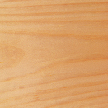
Eastern White Pine
Color: Sapwood is yellowish white to cream colored, heartwood is reddish brown to creamy tan
Density: Soft and very lightweight
Grain: Mixed broad to tight grain with significant difference between winter wood and summer wood (growth rings).
Machinability: Excellent
Finishing: Takes a stain and paint very well.
Distinctive Characteristics: One of the few softwoods produced like hardwood lumber (random width and length), it has been often called “God’s gift to the woodworker” due to its diverse properties and uses.
Common Uses: Exterior millwork, furniture, mouldings, paneling, carvings, turning, pattern making
Other Names: White Pine
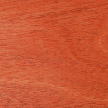
Mahogany
Color: Blood red to reddish brown, sometimes lighter in color with pale red to grayish tinge
Density: Medium texture, moderately heavy
Grain: Fine grain with interlocking parallel runs at times (ribbon)
Machinability: Excellent
Finishing: Takes stain well, will soak it up quite a bit. We suggest using sanding sealer.
Distinctive Characteristics: Has long been a premier choice for high end furniture and millwork. Usually the grade is excellent and average width is wider than most domestic hardwoods. Excellent exterior uses.
Common Uses: High end furniture, interior millwork, exterior doors, windows, and trim
Other Names: Honduras Mahogany, Genuine Mahogany (African Mahogany is genuine also), South American Mahogany
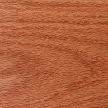
Red Oak
Color: Pinkish red to blonde in color
Density: Very hard and strong
Grain: Openly porous and with dramatic grain patterns. Like White Oak, it is offered in Quartered and Rift grains also.
Machinability: Excellent
Finishing: Due to porous nature it will soak up stains but also offers a wide variety of finish tones.
Distinctive Characteristics: This is probably the most popular hardwood used in modern woodworking. Broad grains give this a pronounced appearance.
Common Uses: Furniture, cabinets, moulding, trim, flooring, paneling, turning
Other Names: Encompasses many individual species: Northern Red, Southern Red, Black, Shumard, Cherrybark, Scarlet, Pin
Available in Certified: Check for availability
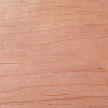
Soft Masple
Color: Creamy white to grayish white sapwood, heartwood can be brown to greenish brown with some mineral streaks.
Density: Moderately hard and strong, not quite as strong as Hard Maple
Grain: Fine, tight closed grain, some flecking evident
Machinability: Excellent
Finishing: Finishes well and also takes a stain very well.
Distinctive Characteristics: The name “Soft Maple” is misleading. This is a very reasonably priced hardwood that is often substituted for Hard Maple in moulding, trim, furniture applications due to price. It can be stained to look like other woods (Cherry, Birch, and Hard Maple).
Common Uses: Furniture, cabinets, moulding, trim, flooring, paneling, chair parts
Other Names: Red Maple, Maple
Available in Certified: Check for availability.
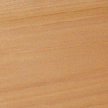
Yellow Poplar
Color: White to yellowish cast sapwood, heartwood is straw brown to green with occasional purple mineral streaks
Density: Light weight, but moderately stiff with good strength-but low in shock resistance
Grain: Relatively straight grained, closed
Machinability: Very good
YellowFinishing: Holds paint well, dark stains are preferred over light ones due to the heartwood repelling absorption to some degree.
Distinctive Characteristics: Widely used because it is cheaply priced and very diverse.
Common Uses: Interior trim, mouldings, paneling, furniture interior parts
Other Names: Tulipwood, Tuliptree, Tulip Poplar, Yellow Poplar, Old
Moisture and its effect on wood
Wood is a hygrospic material. That means it is porous and accepts and gives off moisture depending on the environment of it’s installation. Wood products are best suited in a relative humidity level of 45%. Different parts of the U.S. or world will have different humidity levels throughout the year. Our lumber is shipped at 6-9% moisture content. You are advised to allow any wood product time to acclimate to it’s environment. A minimum of 2-3 weeks is the recommended time.

